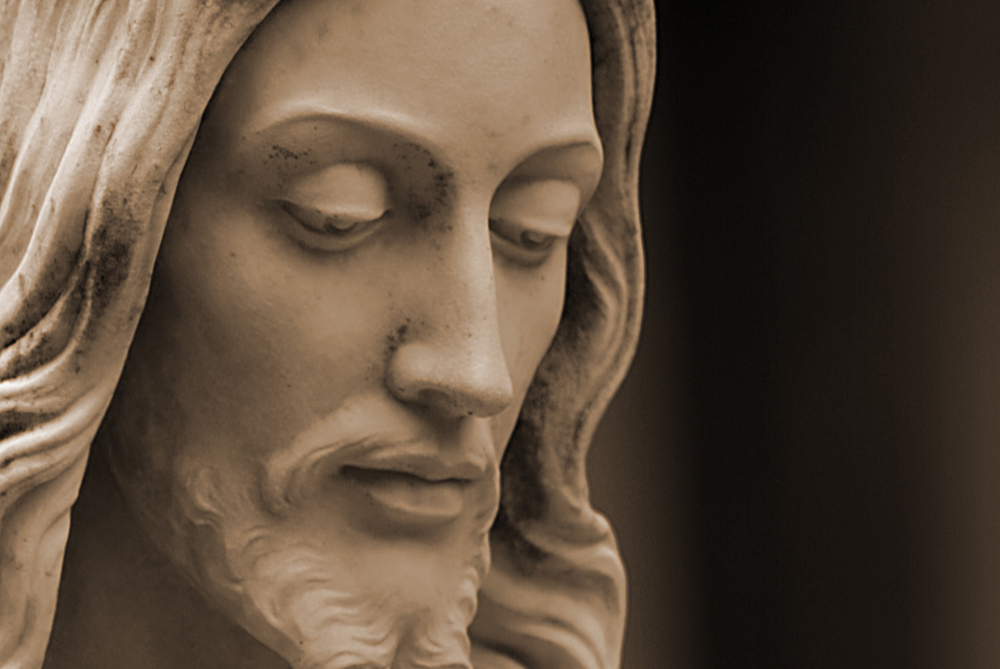
I am the good shepherd, and I know
mine and mine know me.
John 10:14
KERYGMA: JESUS’ MESSAGE
Jesus is the most important figure in the history of mankind, and he has a powerful message for us. It is an invitation that we can word like this:
I am God, and I have come to you because I love you. I have come to redeem you, by sacrificing myself to save you from sin and the corruption that is in the world, so that you can participate in the divine nature, which is the very life of God. Trust in me. Turn away from other pursuits, and follow me. Do not be afraid. (See John 10:30, John 15:9, John 3:16-17, 2 Peter 1:4, Mark 10:21, Matthew 16:24, John 14:1, Matthew 14:27)
This proclamation is called the kerygma, from the Greek words meaning “proclaim” and “herald.” This kerygma is an instrument of divine power: the person who hears it and responds as Jesus intends will enter into the mystery of God’s love, knowing him personally and being transformed by that love. The kerygma is the heart of the Gospel. Understanding it is the first step in encountering Jesus. And so we look to the Gospels in order to know Jesus.
GET TO KNOW JESUS IN THE GOSPELS
The Gospels are the divinely inspired documentation of Jesus’ actual words and actions while he walked the earth. There are four Gospels, the first four books of the New Testament: Matthew, Mark, Luke, and John. These books are the heart of the whole Bible because they relay the powerful teachings of our Redeemer.
The formation of these writings came in three stages. First was the actual life and teaching of Jesus, then came the oral transmission of these events by the apostles, and finally this tradition was written down by the sacred authors under the inspiration of the Holy Spirit (see CCC, 126). Each Gospel writer presents the events and teachings of Christ in a different way, illuminating different details.
The intentionally revealed events of Jesus’ life and teachings in the Gospels share something very important: Christ’s life is a manifestation of God the Father’s love for us (see CCC, 516). Jesus Christ, the Son of God, the long-awaited Messiah, teacher, healer, and Savior, is honest, loving, and challenging—calling us to give up everything and follow him.
There are several ways to approach reading the Gospels; the easiest and most obvious is to simply start reading. The Gospel of Mark is the shortest and probably the oldest, so many people start there. I suggest you purchase a Catholic Bible, pray for guidance, and dive in. There are several Catholic guides and commentaries to assist you, such as The Catholic Commentary on Sacred Scripture series (Baker Publishing) and the Six Weeks with the Bible series (Loyola Press). To find a Catholic Bible study group in your area, check your church bulletin or go to Ascension Press’s website, ascensionpress.com/study/map_search.
A Gospel reading is part of daily Mass, so reading that each day is good also. The daily readings are posted on several websites and on different apps, such as the Catholic Daily Readings app (Daily Apps Co.) or the Laudate app. Reflections on the daily Gospel are posted on Evangeli.net (M&M Euroeditors, S.L.). Keeping a journal of specific ways the Gospel inspires you can encourage you and help you grow closer to Jesus.
CONVERSE WITH JESUS IN PRAYER
We know from reading the Gospels that prayer is important to God. We see that Jesus prayed to the Father often, day and night (see Matthew 14:23; Luke 11:1). His pattern of prayer is the model for how our prayer life should be. Prayer connects us closely with God and teaches us to lean on him for everything. Prayer is part of God’s perfect plan for our existence. It makes a difference not just in our lives but also in the lives of others.
“Christian prayer is cooperation with his [God’s] providence, his plan of love for men” (CCC, 2738). If we pray, we will encounter Jesus Christ. “In prayer the Holy Spirit unites us to the person of the only Son, in his glorified humanity” (CCC, 2673).
In theory, prayer should be very easy. It is essentially talking to Jesus, telling him everything, just as we would a spouse, close friend, sibling, or parent. So why does something so easy become so difficult to continue regularly? We might think at times that there is no point to prayer, that we are not being heard, or that it feels dry, with no consolation. These are common difficulties, part of the spiritual battle Christians face. The key to prayer is to push through these thoughts and just do it and do it often, no matter how we feel.
If prayer seems difficult, these tips might help:
- Schedule It: Scheduling prayer into our day might be the only way to make sure we actually pray. We make appointments for everything, so why not put Jesus on the calendar? Our time with him is the most beneficial time of the day. Once we start praying at set times, prayer will naturally become part of our lives.
- Create a Prayer Space: A peaceful and comfortable place for prayer is a wonderful addition to any home. A crucifix, an image of Jesus, candles, and other objects can help us focus on our divine guest.
- Pray Out Loud: Sometimes our thoughts dart from one thing to another. If we talk aloud, as we would to any other person, we might find it is easier to focus.
- Sit in Silence: We can sit in silence and look at a crucifix or a picture of Jesus—just be in his presence and listen.
- Show Love and Gratitude: We might fall into the habit of continuously asking God for things. We must remember to tell Jesus that we love him and to thank him for everything he has done for us–for our lives and for all our blessings. There is so much to be grateful to Jesus for.
- Pray in Everyday Situations: We can cultivate the habit of including Jesus in everyday occurrences. For example, we can thank him quietly during a joyful moment and ask him for courage during a difficult one.
- Pray with Family and Friends: Jesus tells us that when two or three are gathered, he is there (see Matthew 18:20). God wants us to pray with each other and for each other.
- Don’t Hold Back: It’s okay to express anger, confusion, and other emotions in prayer. Jesus already knows our thoughts and feelings, good and bad, and talking them out with him is exactly what he wants us to do. This is a very healing practice.
- Meditate on Scripture and Other Spiritual Reading: Praying in this manner acquaints us with God and his ways, deepening our relationship with him.
MEET JESUS IN THE SACRAMENTS
The sacraments connect us with Jesus and pour into our souls his love and grace. “The sacraments are perceptible signs (words and actions) accessible to our human nature. By the action of Christ and the power of the Holy Spirit they make present efficaciously the grace that they signify” (CCC, 1084).
Jesus desired to create tangible ways he could be present to us after he ascended into heaven, so he instituted the seven sacraments: baptism, confirmation, Eucharist, reconciliation, marriage, holy orders, and anointing of the sick. These are dispensed through his Church, the Catholic Church, by ordained bishops, priests, and deacons. When we receive the sacraments, we share in the divine life of God. He is made present within us, to transform and guide us to eternal life.
The sacraments are very generous gifts from God. His intention is that we utilize them frequently. God literally pours out his love for us through the sacraments, giving us life in Christ. “Sacraments are ‘powers that come forth’ from the Body of Christ, which is ever-living and life-giving. They are actions of the Holy Spirit at work in his Body, the Church. They are ‘the masterworks of God’ in the new and everlasting covenant” (CCC, 1116). Please refer to chapter 4 for information on each sacrament.
SUGGESTED READING
- The Bible Compass: A Catholic’s Guide to Navigating the Scriptures, Edward Sri.
- The Gospel of Mark (Catholic Commentary on Sacred Scripture), Mary Healy.
- Jesus of Nazareth, three volumes, Pope Benedict XVI.
- Jesus: What Catholics Believe, Alan Schreck.
- The Life of Christ, Abp. Fulton Sheen.
- Time for God, Fr. Jacques Philippe.
- To Know Christ Jesus, Frank J. Sheed.
This page is taken from the book, A Miracle Awaits: Encountering Christ In His Church by Carol Dintelman, which is available for purchase in print or digital formats here.
Or read the full book online! Click to visit the contents page, endorsements, copyright, acknowledgments, and notes.

